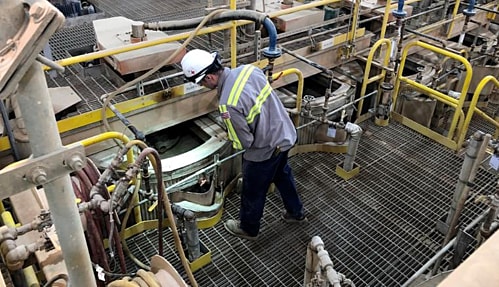US tries to revive industry to avoid dependence on China
MP Materials owns the Mountain Pass mine - the only mine in the US that still produces rare earths.
Less than an hour’s drive from Las Vegas, miners at Mountain Pass, California, are reviving an industry that had all but disappeared from the United States. This is the only mine in the country that still produces rare earths – the materials needed for all modern electronics.
“If the United States ever has a rare earth industry, we will be the leader,” said James Litinksy, co-president of MP Materials, the company that owns the mine in Mountain Pass, California. Mining operations at Mountain Pass were halted after the previous owner went bankrupt in 2015. But over the past two years, MP Materials has been working to rebuild. 200 people work at the mine, performing all stages, from blasting, using trucks to transport minerals out of the mine, to grinding them into powder and packaging them into bags at the construction site.
MP Materials says it supplies about 10% of the world's rare earths. The rest comes from China, where labor costs are cheaper and environmental standards are lower.
|
MP Materials' mining area at Mountain Pass. Photo:CNN |
The rare earth market is expected to grow rapidly over the next decade as the world becomes increasingly dependent on high-tech products. With the US and China locked in a trade war, some officials and experts say the US should find alternative sources of these essential minerals. First, increase mining, then develop processing.
China’s dominance of rare earths has raised alarm bells in the US administration, particularly the Department of Defense, which needs rare earths to make products such as fighter jets, missile defense systems and satellites. Chinese media hinted in May that the country might restrict rare earth exports, considering them a weapon in the trade war. Chinese President Xi Jinping has also visited a rare earth production facility in the country.
"The Chinese want to maintain this dependence and see it as leverage. So I wouldn't be surprised if they consider using it more," said Eugene Gholz, a professor at the University of Notre Dame.
The US Department of Defense said it will work with President Donald Trump, Congress and industry representatives to reduce America’s dependence on China for rare earths. Mountain Pass will obviously be at the center of this effort. Experts say the area contains the world’s top-quality rare earths.
|
An MP Materials worker inspects equipment. Photo:CNN |
The problem is that Mountain Pass cannot currently separate rare earths into other forms for the supply chain. All of the products are then exported to China for processing.
Experts say this is the real challenge in diversifying the supply chain. “The extraction and concentration are actually the easy parts,” says Roderick Eggert, an economics professor at the Colorado School of Mines. “The hard part is the separation.”
James Litinsky said Mountain Pass will have its own separation facility next year, allowing it to make rare earth oxides that can be sold directly to companies around the world. The former owner spent $1.7 billion upgrading the facility and making it more environmentally friendly, but it was abandoned when the company went bankrupt. The giant separation plant is also currently unused.
Litinsky hopes to one day handle the entire supply chain, from mining to manufacturing magnets, motors and other rare earth products used directly in consumer products. Currently, nearly every last step is done in China or Japan.
Litinsky said the trade war between Washington and Beijing was a driving force behind the company’s push to achieve this goal. “A lot of people doubted us, so we felt a lot of pressure. But since the trade war broke out, we’ve become more aware of what we have to do,” he said.
Litinsky said several government officials have visited Mountain Pass. Trade war or not, he believes he is building an economically viable and competitive industry. He hopes officials and businesses see the strategic importance of the company, recognizing the advantage Chinese manufacturers have enjoyed thanks to government subsidies and lax environmental regulations.
“We don’t need any support. We just need a level playing field to compete,” Litinsky concluded.



